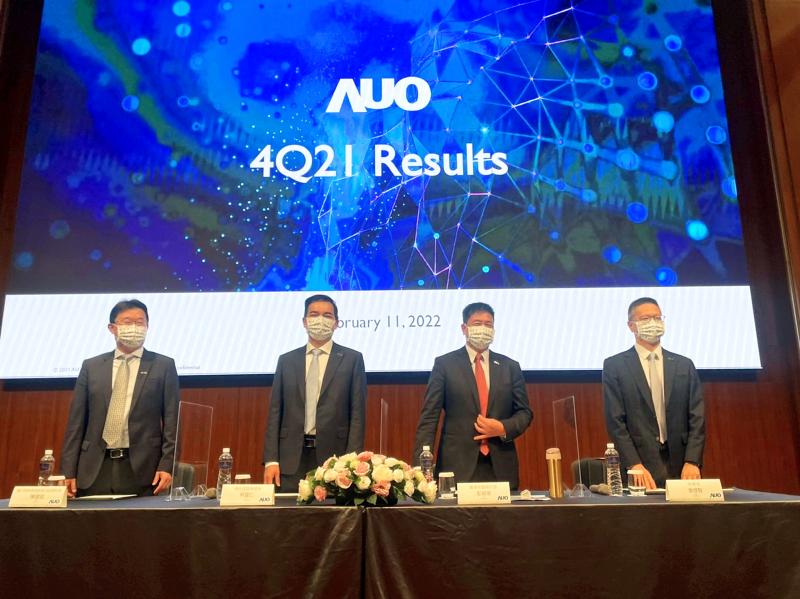AU Optronics Corp (AUO, 友達光電) is planning to build an advanced flat-panel plant in Taichung, aiming for commercial production by 2025, the Hsinchu-based company said on Friday, as it reported a record net profit for last year, driven by strong global demand.
AUO chief financial officer Benjamin Tseng (曾煜智) told an investors’ conference that the company’s board had approved increasing its capital expenditure budget by NT$28 billion (US$1.01 billion) this year, part of which would be allocated to the construction of the new plant.
AUO expects an overall capital expenditure of NT$45 billion this year, Tseng said.

Photo: Chen Mei-ying, Taipei Times
AUO chairman Paul Peng (彭双浪) said the company would spend more next year to install the plant’s equipment and prepare for its commercial operations by 2025.
The new plant would be in the Central Taiwan Science Park (中部科學園區) in Taichung’s Houli District (后里), Peng said.
AUO president and chief operating officer Frank Ko (柯富仁) said the plant would be a smart production site for advanced 8.5th and perhaps 8.6th-generation flat screens, as part of AUO’s efforts to set up micro-LED display production.
The company is weighing whether to use amorphous silicon technology or low-temperature polysilicon technology on the plant’s production lines, Ko said.
AUO reported a record NT$61.33 billion in net profit for last year, up 1,716.5 percent from a year earlier, with earnings per share of NT$6.44, compared with NT$0.36 in 2020.
Its consolidated sales rose 36.8 percent year-on-year to NT$370.69 billion last year, the company said.
AUO said it benefited from a booming global stay-at-home economy in the first half of last year, amid the COVID-19 pandemic.
In the second half, when many countries eased movement restrictions, business activity increased, driving demand for products in the business sector, it added.
Gross margin grew to 24.5 percent, compared with 8.4 percent in 2020, AUO said.
Screen shipments rose 0.6 percent from a year earlier to 25.72 million square meters last year, the company said.
Peng said shipments of large screens dropped sharply in the second half of last year, but the decline has been showing signs of moderating, while inventory levels have reached healthy levels.
So far this year, inflationary pressure has pushed up raw material prices, creating uncertainty in the flat-panel industry, he said.
With the global electric vehicle market gaining momentum, business opportunities are growing in the industry, which might offset the weakness of the TV panel market, Peng said.

UNCERTAINTY: Innolux activated a stringent supply chain management mechanism, as it did during the COVID-19 pandemic, to ensure optimal inventory levels for customers Flat-panel display makers AUO Corp (友達) and Innolux Corp (群創) yesterday said that about 12 to 20 percent of their display business is at risk of potential US tariffs and that they would relocate production or shipment destinations to mitigate the levies’ effects. US tariffs would have a direct impact of US$200 million on AUO’s revenue, company chairman Paul Peng (彭雙浪) told reporters on the sidelines of the Touch Taiwan trade show in Taipei yesterday. That would make up about 12 percent of the company’s overall revenue. To cope with the tariff uncertainty, AUO plans to allocate its production to manufacturing facilities in

TAKING STOCK: A Taiwanese cookware firm in Vietnam urged customers to assess inventory or place orders early so shipments can reach the US while tariffs are paused Taiwanese businesses in Vietnam are exploring alternatives after the White House imposed a 46 percent import duty on Vietnamese goods, following US President Donald Trump’s announcement of “reciprocal” tariffs on the US’ trading partners. Lo Shih-liang (羅世良), chairman of Brico Industry Co (裕茂工業), a Taiwanese company that manufactures cast iron cookware and stove components in Vietnam, said that more than 40 percent of his business was tied to the US market, describing the constant US policy shifts as an emotional roller coaster. “I work during the day and stay up all night watching the news. I’ve been following US news until 3am

COLLABORATION: Given Taiwan’s key position in global supply chains, the US firm is discussing strategies with local partners and clients to deal with global uncertainties Advanced Micro Devices Inc (AMD) yesterday said it is meeting with local ecosystem partners, including Taiwan Semiconductor Manufacturing Co (TSMC, 台積電), to discuss strategies, including long-term manufacturing, to navigate uncertainties such as US tariffs, as Taiwan occupies an important position in global supply chains. AMD chief executive officer Lisa Su (蘇姿丰) told reporters that Taiwan is an important part of the chip designer’s ecosystem and she is discussing with partners and customers in Taiwan to forge strong collaborations on different areas during this critical period. AMD has just become the first artificial-intelligence (AI) server chip customer of TSMC to utilize its advanced

Six years ago, LVMH’s billionaire CEO Bernard Arnault and US President Donald Trump cut the blue ribbon on a factory in rural Texas that would make designer handbags for Louis Vuitton, one of the world’s best-known luxury brands. However, since the high-profile opening, the factory has faced a host of problems limiting production, 11 former Louis Vuitton employees said. The site has consistently ranked among the worst-performing for Louis Vuitton globally, “significantly” underperforming other facilities, said three former Louis Vuitton workers and a senior industry source, who cited internal rankings shared with staff. The plant’s problems — which have not